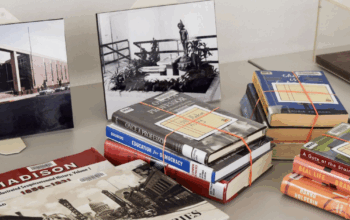A city committee will release recommendations for police reforms, including the recommendation for an independent monitor and civilian oversight board, in the next few months.

The committee, referred to as the Madison Police Department Policy and Procedure Review Ad Hoc Committee, was formed in 2015 to conduct a review of MPD and address concerns over police brutality in Madison. In particular, the group was formed to respond to the death of Tony Robinson, a 19-year-old black man, who was shot and killed by police officer Matthew Kenny.
In June 2016, the committee spent $400,000 for an outside consulting group, OIR, to conduct an independent review the Madison Police Department. OIR looked at MPD’s policies, practices, culture and training and came up with 146 recommendations on reforms for the department. The Ad Hoc committee is charged with sorting through this 258 page document, as well as suggestions from community organizations and individuals, and has spent the last three and a half years meeting monthly to discuss these recommendations.
“We wanted to make sure to be through, that’s the biggest thing,” Matthew Brauginn, a member of the committee and co-founder of the organization Young, Gifted and Black, said. “We wanted to do our do diligence, and think through some pretty complex things, and taking into account a lot of intersecting social issues, such as homelessness, race, class, mental health and all sorts of things.”
The committee has already passed a number of recommendations, including raising use-of-force standards and implementing a mental health first response team.
A major recommendation of the OIR group that the committee has approved is to implement an independent monitor or office, which would function as a third party to monitor the MPD. The monitor, a $200,000 position, would have the ability to review police operating procedures, complaint processes, and officer discretion, behavior and discipline. Brauginn said this is best practice for police departments.
“We need a separate entity that can help provide that check and that oversight that isn’t on the inside that can help them be held accountable to the public that they allegedly serve,” Brauginn said.
MPD has not taken a position opposing the concept of an independent monitor, according to their response to the OIR report.
Along with the independent monitor, the OIR group recommended the formation of a civilian review board. This board would represent the city as a whole, and act as an access point for community concerns to reach the police
The board would actively monitor MPD audits of its programs and activities, police officer use-of-force incidents, and have the authority to conduct independent investigations of personnel, as well as make recommendations for policy issues. It would not have the power to fire or conduct any disciplinary action, and instead would direct these concerns to the Police and Fire Commission, which currently deals with complaints against MPD.
The committee supports this measure, but have not resolved the exact details of the structure and make-up of the board, according to Keith Findley, co-chair of the committee.
“Our hope is that it will help close any perceived gaps in terms of understanding and communication between the police department and the various communications that it serves by providing a formalized mechanism for input and by we hope, helping the community feel confident that its concerns are being heard,” Findley said.
Brauginn said the group has found difficulty in engaging community members with this process. Barriers such as location and timing - the meetings are often over 3 hours, and switch days depending on the month - can prevent community members from attending.
“In a sense that is on us, and in a sense that is the inherent structure of city committees which makes it extremely difficult for marginalized populations to be significantly involved within city committees and within public procedures,” Brauginn said.
Additionally, the almost four year process is a barrier in itself. Brauginn said that some of these issues are hard for even the members to stay engaged on. The committee is down to 12 members, from their original 15. The process is slow: it took the committee around seven hours to move through the independent monitor recommendation, and will probably take another seven hours to move through the civilian review board, Brauginn said.
The committee was hoping the process would take less time, but the complexity and range of issues, as well as the large number of suggestions and recommendations from the community have lengthened the process, Findley said.
Kathy Fullin, a Madison resident of the past 46 years, has attended meetings since they first started as a part of The League of Women Voters. When she spends winters away from Madison, she livestreams the meetings if she can. She said the meetings can be “painful,” and is concerned that the committee won’t have the resolution finalized soon enough to be included in the 2020 budget.
Once finalized, the recommendations also must pass through the City Council. Fullin is hopeful that Mayor Satya Rhodes-Conway and the newly elected council will approve the recommendations, but the process could take a while.




